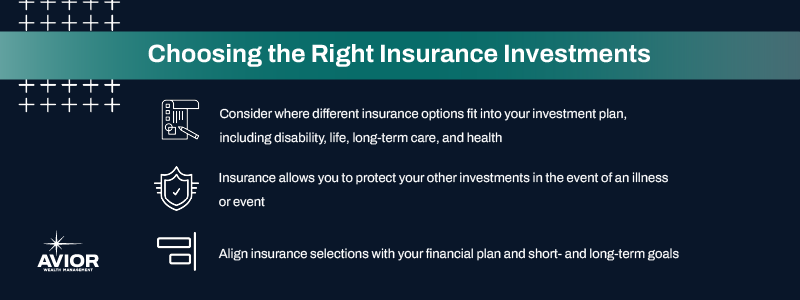Choosing the Right Insurance Investments
Invest in the right insurance options for your financial goals with this quick guide to investment-smart coverages.

One of the biggest factors in insurance planning is weighing whether an investment in coverage is worth it. With any type of insurance, premiums can be expensive, and you’re technically planning for an event that may or may not happen.
Investment-smart insurance refers to the integration of insurance products and strategies into your overall financial plan to enhance and protect your investments. This process involves selecting insurance policies and coverage options that align with your investment objectives, risk tolerance, and long-term financial goals.
Investment-smart insurance recognizes that insurance is a significant investment and aims to optimize your choices and your overall financial portfolio.
Types of insurance plans you may invest in
First, understand which types of insurance plans you may consider as part of your financial plan. Here is a brief guide on common types and where they fit into investment strategies:
Term life insurance
Term life insurance provides coverage for a specified term, typically 10, 20, or 30 years. If the insured individual dies during the term, the death benefit is paid to the beneficiaries. If the policyholder survives the term, no payout is made.
This type of insurance is cost-effective and can be suitable for individuals with short- to medium-term financial protection needs. You can then allocate more funds toward investments, such as stocks or real estate, during the policy term.
Whole life insurance
Whole life insurance provides coverage for the entire life of the insured. It combines a death benefit with a cash value component that grows over time. Premiums are generally higher than term life insurance, but a portion contributes to the cash value.
You can view whole life insurance as a long-term savings vehicle. The cash value can be used to supplement retirement income or fund other investment opportunities. It provides both insurance coverage and forced savings.
Universal life insurance
Universal life insurance offers more flexibility in premiums and death benefits. Policyholders can adjust the amount of coverage and the premium payments. The policy includes a cash value component, and the interest earned is based on market rates or a fixed rate set by the insurance company.
With this option, you get flexibility, making it suitable for those who want to adjust their coverage and premium payments over time. The cash value can be invested in various vehicles, allowing you to align insurance with investment goals.
Annuities
Annuities are financial products designed to provide a stream of income over a specified period or for life. They can be immediate or deferred; an immediate annuity involves a lump-sum payment for immediate income, while a deferred annuity allows funds to grow before converting them into an income stream.
Annuities offer a reliable income stream, complementing other investments that may be subject to market fluctuations. Deferred annuities provide a way to accumulate funds for future income needs, so they are common in retirement planning.
Health insurance
Health insurance covers the costs of medical and surgical expenses. It can include hospital stays, prescription drugs, preventive care, and other health-related expenses.
Medical insurance is crucial for protecting your financial well-being. Unexpected medical expenses can significantly impact your ability to invest and achieve your financial goals. A comprehensive medical insurance plan ensures that health-related costs are managed, helping you focus on your investment strategy without worrying about major medical bills coming along.
Auto insurance
Auto or car insurance provides coverage for damages or liabilities resulting from a car accident. It typically includes coverage for bodily injury, property damage, and sometimes additional protections like comprehensive and collision coverage. Most states require that you have car insurance if you drive and own a vehicle.
In addition, it helps you protect your assets. A comprehensive auto insurance policy ensures that the financial impact of a car accident does not undermine your overall investment strategy.
Long-term care insurance
Long-term care insurance provides coverage for the costs associated with long-term care services, including assistance with activities of daily living, such as bathing, dressing, and eating. This type of insurance is designed to help you cover expenses related to in-home care, assisted living facilities, nursing homes, and other long-term care services.
Long-term care insurance helps protect your assets from being depleted by the high costs of long-term care services. This can be crucial for preserving the financial foundation and inheritance for heirs. In addition, some long-term care insurance premiums may be tax-deductible, providing potential tax advantages.
Disability insurance
Disability insurance provides financial protection if you’re unable to work due to a disability or injury. It offers a monthly benefit, replacing a portion of your income during the disability period. Short-term disability insurance covers temporary disabilities, typically with a waiting period, and long-term provides coverage for an extended period, often until retirement age.
Disability insurance safeguards your income and prevents the need to liquidate investments during disability. It can also contribute to wealth preservation, ensuring a financial foundation for heirs.
Align your insurance with investment goals
Navigating the different benefits of these insurance plans will help you incorporate the right options. Consider your financial goals, your tolerance for financial risk, and the timelines you’re dealing with in your financial plan.
Then, look at key features and benefits of different types of insurance plans. Pay close attention to monthly premiums you have to pay, death benefits of life insurance policies, cash value and accrual, and investment components certain plans may have.
Short-term goals may be to mitigate risk, protect your liquid emergency fund, and secure your income in case of a temporary problem or disability. Long-term goals may be wealth preservation, retirement planning, estate planning, and tax planning.
Balancing insurance costs with investment returns is also key when making your selections. Your different priorities will impact how important it is to maximize returns versus protect your funds.
Understanding the terms and investment options you have with different insurance plans will help you incorporate policies that support your goals.
How to make investment-smart insurance decisions
These considerations are key to ensuring your insurance needs and goals are included in your overall financial plan. With all the insurance options out there, make the selection process simpler by working with a financial expert.
The Avior team of advisors is here to guide you through financial planning, including insurance options and terms.
Talk to us today to get started with more effective wealth management.
Disclaimer: Nothing contained herein should be construed as legal or tax advice. Avior and our Advisors will work with your attorney and/or tax professional to assist with your legal and tax strategies. Please consult your attorney or tax professional with specific legal and/or tax questions. Investment Management and Financial Planner are offered through Avior Wealth Management, LLC, an SEC-registered investment advisor. Past performance is not a guarantee of future results. Investments are subject to loss, including the loss of principal.
No Comments
Sorry, the comment form is closed at this time.




